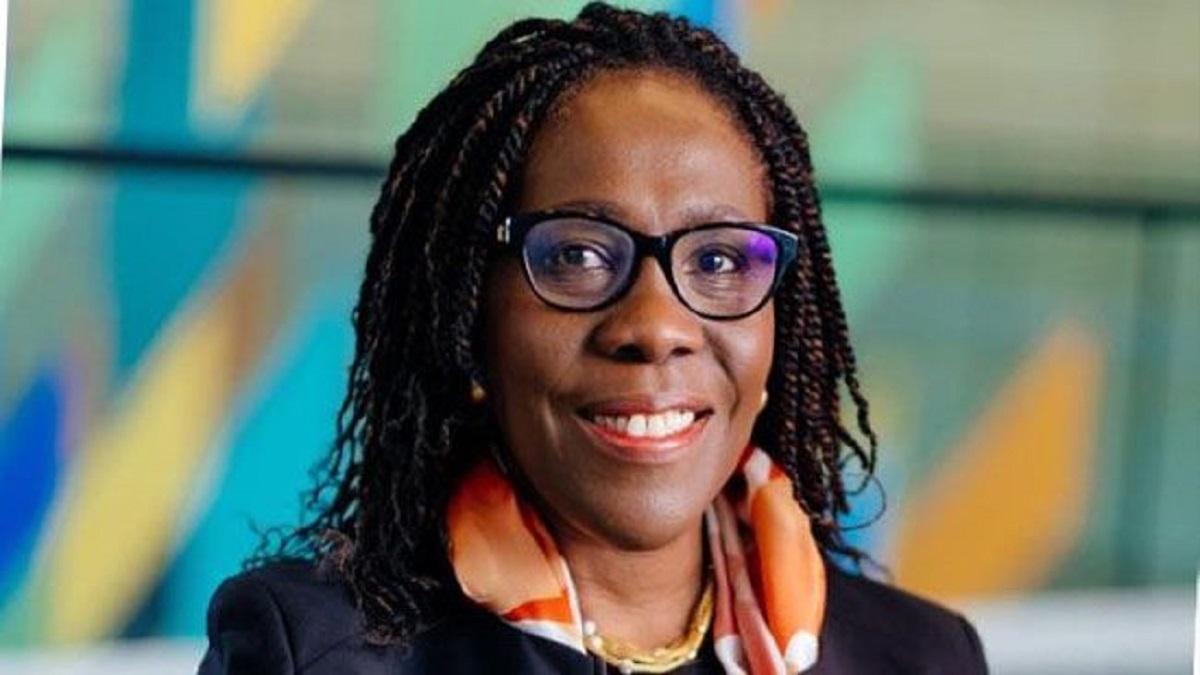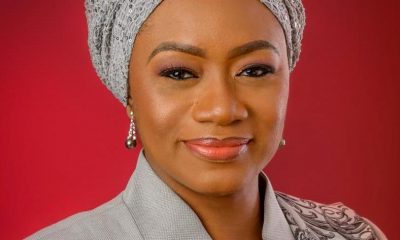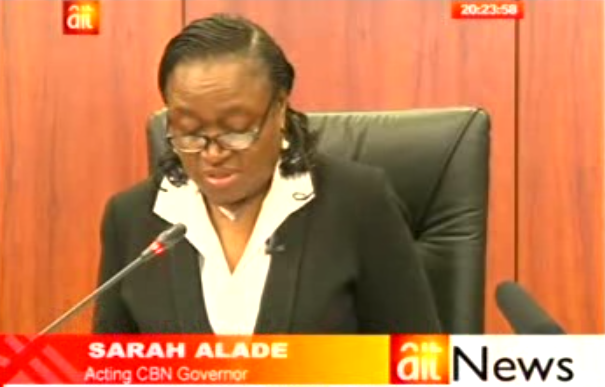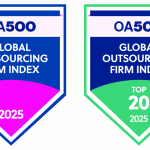Jobs/Appointments
Critics Question Aisha Ahmad’s Qualification for New CBN Job

By Dipo Olowookere
Since Thursday, October 5, 2017, when President Muhammadu Buhari announced Mrs Aishah Ahmad, as the new Deputy Governor of the Central Bank of Nigeria (CBN), there have been controversies trailing the young woman.
Mrs Ahmad was appointed to replace Mrs Serah Alade, who retired in March 2017 as the Deputy Governor of the CBN in charge of Economic Policy.
She is expected to assume duty as CBN deputy governor immediately after her confirmation by the Senate.
A report by Premium Times has said Mrs Ahmad was ‘controversially’ promoted to the position of an Executive Director of Diamond Bank Plc few hours to her announcement for the new CBN job.
But the lender, when contacted by the newspaper, gave a dodgy response to this issue.
Rather than make a categorical comment on when Mrs Ahmad was raised from her position as deputy general manager to executive director, Mr Mike Omeife, Head of Media Relations at the bank, merely said she had been executive director at the bank “for a while”.
He maintained that based on her wealth of experience, she is qualified to be appointed to the new position.
Until her appointment, Mrs Ahmad, a holder of Master of Science, M.Sc degree in Finance & Management from the Cranfield School of Management, United Kingdom (2006-2007) and a Master of Business Administration, MBA in Finance, University of Lagos (1999-2001), was the executive director (Retail Banking) at Diamond Bank Plc.
She is the chairperson, executive council of Women in Management, Business and Public Service, WIMBIZ, a Nigerian non-profit organization focused on issues affecting the interest of women professionals in business, particularly those promoting leadership development and capacity building to engender growth.
Since her appointment, there had been controversies, especially on social media, over her qualification for the CBN job.
SCANTY DETAILS
But in a chat with PREMIUM TIMES on Tuesday, Mr Omeife said the new CBN deputy governor had been an executive director at Diamond Bank “for a while”.
When asked of the specific date, he explained that he might not immediately have the details but he was confident she had been appointed executive director “for a while”.
Our sources maintained Mr Omeife “was economical with the truth”.
Checks by PREMIUM TIMES revealed that details of the bank’s annual report showed that as at December 2016, Mrs Ahmad held the position of Head, Consumer and Privilege Banking. The two executive directors listed in the report are Chizoma Okoli, Executive Director Business Development, and Chiugo Ndubisi, Executive Director/Chief Financial Officer.
Similarly, in its quarterly reports for March and June 2017, the names of the two aforementioned officials remained as executive directors.
Meanwhile, checks on the disclosure platform of the Nigerian Stock Exchange, NSE, for possible announcement of Mrs Ahmad’s elevation also yielded no result as no such disclosure was made throughout 2017.
When contacted on the telephone on Monday, the media officer of the NSE, Joseph Kadiri, could not immediately give response to the request.
He, however, told PREMIUM TIMES to forward the request to him via email and promised to send to appropriate quarters for reply. More than 24 hours after the request was sent with reminders, PREMIUM TIMES has not gotten any response.
But Mr Omeife, Tuesday, suggested that disclosure of Mrs Ahmad’s appointment as ED may not necessarily be made to the Nigerian bourse.
“From the financial services perspective, the CBN handles issues involving people from ED (position) up (wards),” he said.
When asked about the alleged double promotion the new CBN official reportedly enjoyed on the day she was appointed by President Muhammadu Buhari, Mr Omeife said he knew nothing about such development.
“I don’t know about that; all I am meant to understand is that the president appointed her as CBN deputy governor and sent her name to the Senate for approval. I don’t know about that (issue of double promotion).
“But I know she is eminently qualified to be the CBN deputy governor and I am expecting young Nigerians to applaud her,” he said, in reference to Mrs Ahmad’s academic and professional antecedents.
He, however, said further enquiries should be directed to the CBN.
But PREMIUM TIMES’ efforts to reach the CBN were futile. Isaac Okorafor, the apex bank’s spokesperson, did not answer or return calls to his known number. He also did not reply to a text message sent to him.
PRIVILEGE BANKING VS ECONOMIC POLICY
Many commentators alleged that her promotion to the position of executive director at Diamond Bank Plc was ‘fast-tracked’, a few hours to the announcement of her name by the Nigerian government.
Insiders at the bank told PREMIUM TIMES she was promoted executive director hours to the announcement of her appointment to the CBN position. There was a company-wide announcement to that effect, our sources said.
However, the CBN Act does not require that an appointee to that position must be an executive director of a bank, and it is not clear why she had to be controversially upgraded.
Section 8 sub-section 1 of the CBN Act 2007 states, among others, that: “The Governor and Deputy Governors “shall be persons of recognised financial experience and shall be appointed by the President subject to the confirmation of the Senate.”
Some commentators argue that Mrs Ahmad’s expertise may not be the kind of skills needed at the CBN. She is better known for overseeing privilege banking, securing accounts from high net-worth individuals, and providing private client services to wealthy customers. Her understanding of economic policies remained unclear.
Abdul Mahmud, an Abuja-based attorney, said of the appointment, “That she replaces Sarah Alade as Deputy Governor of CBN in charge of economic policy- monetary policy, financial market, etc, before her retirement, makes her catapult curious.
“With a background in accounting and professional training in consumer banking, you would ask: what was her appointor thinking? She is not a monetarist, there is nothing in her CV that shows that she is nuanced in monetary economics.
“Well, with another misfit, Emefiele, at the helm of CBN, who has been accused of doing wash wash -printing more naira notes- an Emefiele-esque Quantitative Easing (QE) -to address liquidity problem and creating the more serious problem of inflationary pressure- a process of policy catalyzation really- you will understand why the oracle has consistently argued that the government projection of the Economic and Recovery Growth Plan (ERGP) to reduce the inflation rate from 19% to 0% by 2020 is a pipe dream.
“Brace up for harder, perilous, and more difficult economic times.”
Source: Premium Times
Jobs/Appointments
Abdallah Simba to Lead Japan Tobacco International’s Nigerian Operations

By Modupe Gbadeyanka
Mr Abdallah Simba has been chosen to lead the operations of Japan Tobacco International (JTI) in Nigeria effective Thursday, May 1, 2025, succeeding Mr Thomas Adams, who has led the Nigerian business successfully over the past four years.
The new General Manager of the organisation in Nigeria recently served as the Country Manager for Slovakia, where he successfully led profitable multicategory growth and operational strengthening, positioning the business for long-term sustainability.
A statement from the tobacco firm said Mr Simba’s appointment underscores its commitment and ambition to deepen its footprint in the Nigerian market.
“I am delighted to lead JTI Nigeria at this time. Nigeria is an important market with tremendous potential, and I look forward to working with the amazing team here to continue to grow our business in a sustainable manner,” Mr Simba said of his new role.
Mr Simba brings nearly two decades of commercial and strategic leadership experience to the role, having held key positions across multiple markets and at JTI’s global headquarters in Geneva, Switzerland.
He joined JTI in Tanzania in 2005 in Marketing before taking on an international assignment in Ireland in 2009. He later transitioned into broader commercial roles, leading various Sales and Trade Marketing capabilities with increasing responsibility.
In 2013, Mr Simba moved to JTI’s global headquarters in Geneva, where he progressed into senior roles within the Global Commercial Strategy function.
In these roles, he led the optimization of business models, guided market strategies, and up-skilled commercial teams across a wide range of markets.
The new General Manager for Nigeria holds a Bachelor of Science degree from Southern New Hampshire University in International Business.
Jobs/Appointments
Stakeholders See Nigeria’s Outsourcing Industry Exceeding $1.8bn by 2028

By Modupe Gbadeyanka
The outsourcing industry in Nigeria could grow more than $1.8 billion by 2028 from the $980 million it recorded in 2023, stakeholders in the sector have projected.
However, despite recording an impressive annual growth rate of 12.56 per cent, the sector is weighed down by financial inefficiencies.
This was one of the reasons critical players in the landscape brainstormed recently in Lagos to on payroll solutions for sustainable growth.
The gathering was called by a leading human resource and payroll technology company, SeamlessHR, in partnership with the Association of Outsourcing Professionals of Nigeria (AOPN).
More than 30 chief executives of Nigeria’s top outsourcing companies gathered at Four Points by Sheraton, Lagos, on Wednesday, April 30, 2025, for the event themed Enhance Business Efficiency Through Automation and Immersive Workflows.
They agreed that thin margins, inconsistent client payments, and outdated payroll systems have created conditions where salary delays are frequent and talent attrition is on the rise.
Across the industry, many workers now view delayed wage disbursements as normal, with employees often waiting weeks or even months to be paid. For outsourcing firms, the consequences extend beyond cash flow.
Delayed salaries damage brand perception, undermine operational efficiency, and threaten long-term growth. The urgency for innovation in payroll and financial operations has never been greater.
Another key focus of the discussion was the transformative impact of SeamlessHR’s Embedded FInance for employers and employees.
SeamlessHR’s solution enables workers to access earned wages on-demand, bypassing the traditional pay cycle. Through seamless integration with payroll systems, employees can withdraw accrued earnings in real-time to address emergencies or manage cash flow gaps.
Additionally, low-interest salary advances and built-in financial tools empower staff to avoid exploitative lenders and plan their finances with confidence.
“Outsourcing companies face daily liquidity issues, irregular cash flow, and growing payroll obligations.
“SeamlessHR’s Embedded Finance closes that gap by integrating capital into the payroll system to ensure people get paid on time, operations run seamlessly, and CEOs sleep better at night.
“When employees no longer stress about delayed salaries, their engagement and output improves dramatically,” the Director of Embedded Finance at SeamlessHR, Oke Egbi, stated.
Also commenting, the president of AOPN, Mope Abudu, said, “This roundtable addresses a critical challenge in our industry. As key contributors to Nigeria’s economy, we cannot afford to be left behind in the wave of digital transformation shaping the future of work.
“The outsourcing sector must lead in efficiency and innovation, and the integration of intelligent systems that support workforce management.
“Today’s theme speaks directly to that need. By exploring solutions like embedded finance, we open new opportunities to enhance value delivery and improve operational efficiency across our industry. I extend my gratitude to SeamlessHR for bringing this event to life.”
Jobs/Appointments
Ireti Samuel-Ogbu to Head Africa Finance Corporation Board

By Adedapo Adesanya
The Africa Finance Corporation (AFC) has appointed Mrs Ireti Samuel-Ogbu as the Chairman of its board of Directors, succeeding Mr Emeka Emuwa, who completed his 12 years of service to the financer.
She brings over three decades of experience in the banking and financial services industry across Nigeria, Africa, Europe and the Middle East.
Mrs Samuel-Ogbu has extensive boardroom experience, including Citibank Nigeria, where she was a Non-Executive Director for six years and Chair of the Risk Committee prior to becoming the Managing Director.
She also served on the board of CHAPS Clearing UK, the high-value payment system now operated by the Bank of England and a UK-based charity, Opportunity International.
Her extensive experience and unwavering dedication to the advancement of Africa make her an asset to AFC at a time when the corporation is more committed than ever to accelerating Africa’s transformation through bold investments, innovative financing models and catalytic partnerships.
Her international career within Citibank included senior leadership roles across over 50 countries in the Europe, Middle East, and Africa region, during which time she worked in the United Kingdom, Nigeria, and South Africa.
Speaking on the appointment, Mr Samaila Zubairu, President & CEO of AFC, said, “We are delighted to welcome Mrs Ireti Samuel-Ogbu as Chair of the Board. Her wealth of experience, visionary leadership and deep understanding of Africa’s financial landscape will be invaluable as we navigate our next phase of growth- expanding our impact, mobilising urgently needed capital and delivering transformative projects that enable inclusive and sustainable prosperity across the continent.”
Mrs Ireti Samuel-Ogbu commented: “I am honoured to take on the role of Chair at AFC, an institution that serves as a trusted bridge between international capital and Africa’s dynamic growth opportunities.
“I look forward to working closely with the board, management, and all stakeholders to advance the Corporation’s mission and strengthen its role as the leading provider of strategic, investment-driven solutions that unlock Africa’s full economic potential.”
Established in 2007, Africa Finance Corporation (AFC), is the continent’s leading instrumental infrastructure solutions provider, supporting significant infrastructural and sectoral projects that can enhance the productivity and competitiveness of African economies. It achieved a total increase of $1.1 billion in its 2024 financial year performance, a 22.8 per cent increase from the previous financial year.
-

 Feature/OPED5 years ago
Feature/OPED5 years agoDavos was Different this year
-
Travel/Tourism9 years ago
Lagos Seals Western Lodge Hotel In Ikorodu
-

 Showbiz2 years ago
Showbiz2 years agoEstranged Lover Releases Videos of Empress Njamah Bathing
-

 Banking7 years ago
Banking7 years agoSort Codes of GTBank Branches in Nigeria
-

 Economy2 years ago
Economy2 years agoSubsidy Removal: CNG at N130 Per Litre Cheaper Than Petrol—IPMAN
-

 Banking2 years ago
Banking2 years agoFirst Bank Announces Planned Downtime
-

 Sports2 years ago
Sports2 years agoHighest Paid Nigerian Footballer – How Much Do Nigerian Footballers Earn
-

 Technology4 years ago
Technology4 years agoHow To Link Your MTN, Airtel, Glo, 9mobile Lines to NIN


















